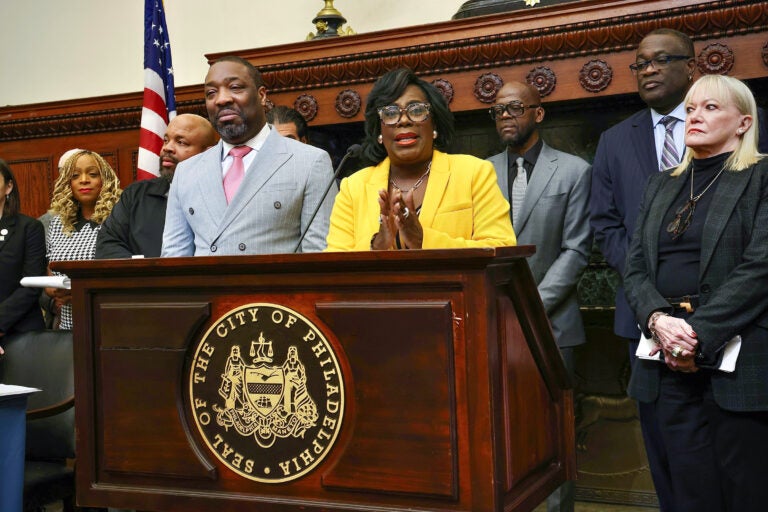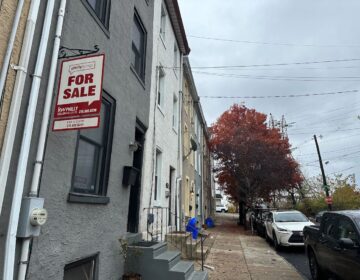What Philly Mayor Parker’s first housing plan budget could mean for renters and homeowners
Some advocates say the proposed H.O.M.E budget doesn't go far enough in prioritizing low-income residents.
Listen 4:56
Mayor Cherelle Parker talks about phase two of her H.O.M.E. program before signing an executive order to spur residential development. (Emma Lee/WHYY)
Have a question about Philly’s neighborhoods or the systems that shape them? PlanPhilly reporters want to hear from you! Ask us a question or send us a story idea you think we should cover.
Philadelphia lawmakers have started poring over the details of a proposed budget for the first year of Mayor Cherelle Parker’s signature housing plan, a $2 billion initiative centered on dozens of programs designed to help renters and homeowners keep a roof over their heads.
The latest proposal, obtained by WHYY News, calls for an annual budget of $194.6 million. Those dollars would go toward a total of 26 programs, including efforts to preserve affordable housing, provide homebuyers with low-interest loans and help tenants facing eviction.
City Council has previously passed legislation related to the Housing Opportunities Made Easy, or H.O.M.E., initiative. Most notably, one measure authorized the city to borrow $800 million in bonds for the plan. But this marks the first time council members are considering how individual programs will be funded and who they will help.
“This is a visionary, multi-million dollar proposal to build and preserve 30,000 units of housing, and establish housing-affordability programs that will serve every neighborhood of Philadelphia. City Council is committed to working collaboratively with the Mayor, community partners and residents to ensure the H.O.M.E. plan is a success,” Council President Kenyatta Johnson said in a statement.
What’s in the proposal?
Johnson and the Parker administration have been negotiating the details of the spending plan since the summer. But his colleagues on Council did not receive the proposal until late last week. The resolution has yet to be formally introduced, meaning it could still change before it becomes publicly available.
For now, nearly half of the funding would be used for preserving and creating affordable housing, according to the resolution. The sum includes $37.5 million in affordable preservation funds, some of which would go to developers for renovation projects and property acquisitions. Another $34.7 million is earmarked for the Basic Systems Repair Program, a wildly popular program that provides free home repairs, including issues with electrical, plumbing and heating.
The rest of the funding would help fund a variety of programs for renters and homeowners. The list includes $15 million to help resolve disputes between landlords and tenants over back rent, as well as about $2 million for low-income tenants to cover their monthly payments. The proposal calls for $25 million for the One Philly Mortgage Program, a new initiative aimed at providing reduced down payments and low-interest loans.
“The H.O.M.E. plan is specifically designed to address Philadelphia’s housing crisis across all income levels. The Parker administration aims to address the crisis holistically, not just [for] one neighborhood or one income bracket,” said Angela Brooks, the city’s chief housing and urban development officer, in a statement.
The programs listed in the proposal would serve households earning roughly between 30% and 120% of the area median income, or AMI, a data point that includes places outside of Philadelphia. For a family of four, that translates to between $35,800 and $143,280 in annual income.
Almost one-third of the proposed budget — just under $60 million — is dedicated to programs serving households that earn up to 60% of AMI. Only one program, a homelessness prevention initiative, is exclusively for households that earn at or below 30% AMI.
The median household income in Philadelphia was $60,500 last year, according to data from the U.S. Census Bureau.
Housing advocates who have reviewed the proposal say the budget doesn’t do enough to help and prioritize the city’s most vulnerable renters and homeowners, many of whom are considered cost-burdened. These are households that spend more than 30% of their income on housing costs.
“In the midst of a housing crisis, when we are already seeing major cuts from the federal government, we want to see our mayor and City Council step up to protect those of us most at risk of being pushed out of our homes and neighborhoods,” said David Evans, leader of Reclaim Philadelphia’s Homes for All Caucus.
“We support deep investment in housing and we are glad that the city has heard our call for increased funding for home repairs. We know, however, that those who are most affected by the housing crisis need to be prioritized. This plan falls short of that,” said Shawmar Pitts, co-managing director at Philly Thrive.
What happens next?
Evans and Pitts are part of a new coalition of affordable housing advocates who intend to push lawmakers and the mayor for greater investments in programs that support low-income homeowners and renters “at the forefront of the housing crisis.”
They’ll have at least one lawmaker in their corner. City Councilmember Jamie Gauthier, who chairs the body’s housing committee, said in a statement that she will push to help households earning less than $30,000 a year — “families who are just one maintenance emergency or rent hike away from homelessness.”
“I am encouraged that the mayor’s proposed budget for the first year of her H.O.M.E. Initiative reflects several changes I championed this spring, especially around strengthening home repair programs. With Council’s legally required 60-day review period now underway, I look forward to working closely with Mayor Parker, Council President Johnson, my Council colleagues, and the community to carefully review and tweak this proposal,” Gauthier said.
It’s unclear when the resolution will be introduced in Council or whether there will be public hearings on the budget once that happens, though that is the expectation given the amount of taxpayer dollars at play.
The Philadelphia Redevelopment Authority is expected to borrow the $800 million in two tranches, with the first coming this fall and the second about two years later. Finance Director Rob Dubow has said the bond issuance would ultimately cost taxpayers about $1.3 billion when interest is taken into account. And while rates will vary, he said there would be an average of $25 million a year in interest payments over 20 years.
That timeline appears to have softened. Brooks, the housing chief, said the administration is “confident” that Council will pass the budget “in time for us to issue bonds this year.”
“We have worked closely with Council President Johnson and the majority of City Councilmembers, and we look forward to making Housing Opportunities Made Easy a reality for everyday Philadelphians,” Brooks said.
WHYY is your source for fact-based, in-depth journalism and information. As a nonprofit organization, we rely on financial support from readers like you. Please give today.








